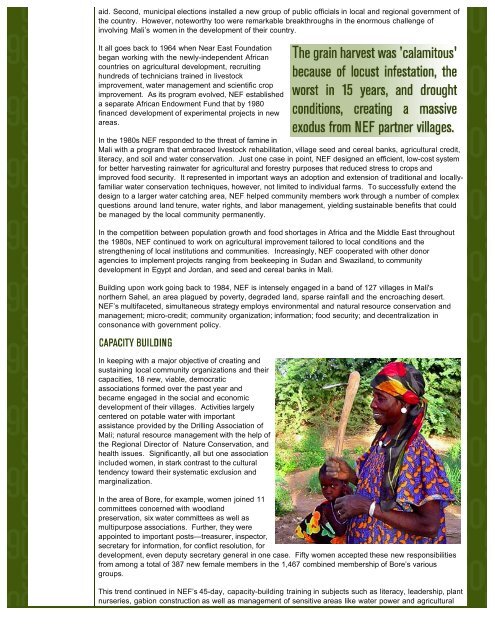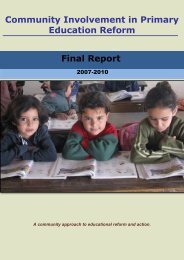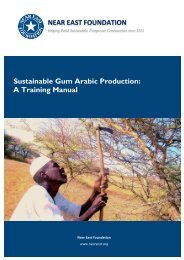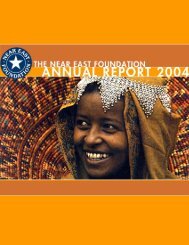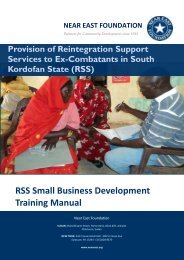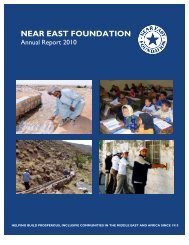NEF 2005 Annual Report - Near East Foundation
NEF 2005 Annual Report - Near East Foundation
NEF 2005 Annual Report - Near East Foundation
You also want an ePaper? Increase the reach of your titles
YUMPU automatically turns print PDFs into web optimized ePapers that Google loves.
aid. Second, municipal elections installed a new group of public officials in local and regional government of<br />
the country. However, noteworthy too were remarkable breakthroughs in the enormous challenge of<br />
involving Mali’s women in the development of their country.<br />
It all goes back to 1964 when <strong>Near</strong> <strong>East</strong> <strong>Foundation</strong><br />
began working with the newly-independent African<br />
countries on agricultural development, recruiting<br />
hundreds of technicians trained in livestock<br />
improvement, water management and scientific crop<br />
improvement. As its program evolved, <strong>NEF</strong> established<br />
a separate African Endowment Fund that by 1980<br />
financed development of experimental projects in new<br />
areas.<br />
In the 1980s <strong>NEF</strong> responded to the threat of famine in<br />
Mali with a program that embraced livestock rehabilitation, village seed and cereal banks, agricultural credit,<br />
literacy, and soil and water conservation. Just one case in point, <strong>NEF</strong> designed an efficient, low-cost system<br />
for better harvesting rainwater for agricultural and forestry purposes that reduced stress to crops and<br />
improved food security. It represented in important ways an adoption and extension of traditional and locallyfamiliar<br />
water conservation techniques, however, not limited to individual farms. To successfully extend the<br />
design to a larger water catching area, <strong>NEF</strong> helped community members work through a number of complex<br />
questions around land tenure, water rights, and labor management, yielding sustainable benefits that could<br />
be managed by the local community permanently.<br />
In the competition between population growth and food shortages in Africa and the Middle <strong>East</strong> throughout<br />
the 1980s, <strong>NEF</strong> continued to work on agricultural improvement tailored to local conditions and the<br />
strengthening of local institutions and communities. Increasingly, <strong>NEF</strong> cooperated with other donor<br />
agencies to implement projects ranging from beekeeping in Sudan and Swaziland, to community<br />
development in Egypt and Jordan, and seed and cereal banks in Mali.<br />
Building upon work going back to 1984, <strong>NEF</strong> is intensely engaged in a band of 127 villages in Mali's<br />
northern Sahel, an area plagued by poverty, degraded land, sparse rainfall and the encroaching desert.<br />
<strong>NEF</strong>’s multifaceted, simultaneous strategy employs environmental and natural resource conservation and<br />
management; micro-credit; community organization; information; food security; and decentralization in<br />
consonance with government policy.<br />
In keeping with a major objective of creating and<br />
sustaining local community organizations and their<br />
capacities, 18 new, viable, democratic<br />
associations formed over the past year and<br />
became engaged in the social and economic<br />
development of their villages. Activities largely<br />
centered on potable water with important<br />
assistance provided by the Drilling Association of<br />
Mali; natural resource management with the help of<br />
the Regional Director of Nature Conservation, and<br />
health issues. Significantly, all but one association<br />
included women, in stark contrast to the cultural<br />
tendency toward their systematic exclusion and<br />
marginalization.<br />
In the area of Bore, for example, women joined 11<br />
committees concerned with woodland<br />
preservation, six water committees as well as<br />
multipurpose associations. Further, they were<br />
appointed to important posts—treasurer, inspector,<br />
secretary for information, for conflict resolution, for<br />
development, even deputy secretary general in one case. Fifty women accepted these new responsibilities<br />
from among a total of 387 new female members in the 1,467 combined membership of Bore’s various<br />
groups.<br />
This trend continued in <strong>NEF</strong>’s 45-day, capacity-building training in subjects such as literacy, leadership, plant<br />
nurseries, gabion construction as well as management of sensitive areas like water power and agricultural


